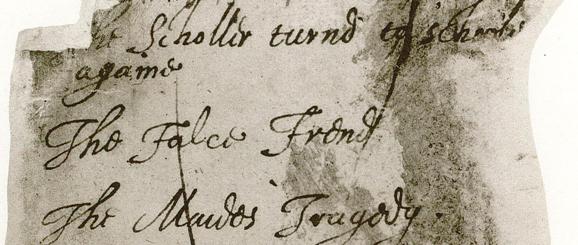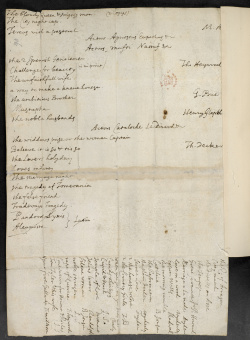False Friend
Historical Records
Cotton MS. Tiberius E. X.

Excerpt from p10 of Marcham (out of copyright)
In 1925 Frank Marcham transcribed and published the contents of the then British Museum manuscript, Cotton MS. Tiberius E. X. It contains the History of Richard III by the Master of the Revels, Sir George Buck, written on what appears to be “Revels Office waste,” sometime after 1617 (Chambers, RES 479). Amongst the papers are “four lists of plays, bare lists without any indication of their objects,” which may or may not be all in Buck’s hand (Chambers, RES 479). Chambers believes it “most likely that the lists represent plays which the Revels Office had at some time or times under consideration for performance at court” (RES 484). The list designated ‘B’ by Chambers (f.197v) contains “The Falce Frend.”
Hill’s List of Early Plays in Manuscript
An entry for "the false friend" appears as the 48th play listed by Abraham Hill (1635-1721) in his list of plays in manuscript (Adams 74). Hill's full list of plays is available here.

Theatrical Provenance
Unknown company at court (Harbage). Chambers (RES 484) suggests that the plays in Buck’s list, written on Revels Office scrap paper, were under consideration for performance at court.
Probable Genre(s)
Unknown (Harbage)
Possible Narrative and Dramatic Sources or Analogues
(Information needed)
References to the Play
(Information needed)
Critical Commentary
Chambers suggests that the play is “[p]erhaps identical with The False One printed in the Beaumont and Fletcher collection of 1647, with an actor-list of the King’s men pointing to 1619-23” (RES 481). Harbage also notes the possibility of an equation with False One, 1620. Bentley hesitates to identify the two plays though (V.1331).
Adams, in the context of Hill’s list which was probably written between 1677 and 1703, cites this speculative equation and adds: “We hardly need consider Mrs. Pix’s The False Friend, or The Fate of Disobedience, produced at Lincoln’s Inn Fields in 1699, or Vanbrugh’s The False Friend, produced at Drury Lane in 1702” (98). His scepticism is supported by Bentley (V.1331-32) who thinks that “[c]onsidering the late date of these two plays and the general character of the list, it seems a little more likely that the play Hill saw was the one considered in the Revels Office in Jacobean times.”
For What It's Worth
(Information needed)
Works Cited
Site created and maintained by David McInnis, University of Melbourne; updated, 24 Feb 2015.